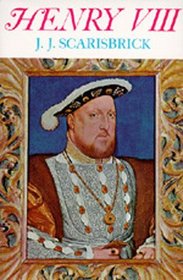Editorial Reviews
Review
First published in 1968
Written by a British academician, this first comprehensive life of Henry VIII to appear in sixty-five years presents a new viewpoint of the "bullock-like" monarch and his reign, based on modern thinking and present-day research. The author, presupposing a general knowledge of Henry on the part of his readers, deals in detail with the political, religious and international aspects of his reign rather than with the more lurid incidents of his personal life. The picture which emerges from this study is of a vacillating man, believing scurrilous rumors, and brutal to those he considered his enemies, but probably less bloodthirsty than history has painted him. Henry became king at the age of fifteen, on the death of his older brother Arthur. When he died, thirty-seven years later, England had endured and survived costly and futile wars with France, embroilments with Spain and Scotland, and an overwhelming political and religious revolution brought about by the split with the Papacy over his divorce from his first wife, Catherine of Aragon, and his marriage to Ann Boleyn. The fortune he amassed through carnage went to wage useless wars, but out of the turmoil England gained a sense of national unity, and on Henry's death in 1547, he was "revered and in a strange way, even loved." This scholarly, well-written and copiously documented book is essential for all libraries of Tudor history and all students of the subject; it is not for bedside tables. (Kirkus Reviews) --This text refers to an out of print or unavailable edition of this title.
Review
First published in 1968
Written by a British academician, this first comprehensive life of Henry VIII to appear in sixty-five years presents a new viewpoint of the "bullock-like" monarch and his reign, based on modern thinking and present-day research. The author, presupposing a general knowledge of Henry on the part of his readers, deals in detail with the political, religious and international aspects of his reign rather than with the more lurid incidents of his personal life. The picture which emerges from this study is of a vacillating man, believing scurrilous rumors, and brutal to those he considered his enemies, but probably less bloodthirsty than history has painted him. Henry became king at the age of fifteen, on the death of his older brother Arthur. When he died, thirty-seven years later, England had endured and survived costly and futile wars with France, embroilments with Spain and Scotland, and an overwhelming political and religious revolution brought about by the split with the Papacy over his divorce from his first wife, Catherine of Aragon, and his marriage to Ann Boleyn. The fortune he amassed through carnage went to wage useless wars, but out of the turmoil England gained a sense of national unity, and on Henry's death in 1547, he was "revered and in a strange way, even loved." This scholarly, well-written and copiously documented book is essential for all libraries of Tudor history and all students of the subject; it is not for bedside tables. (Kirkus Reviews) --This text refers to an out of print or unavailable edition of this title.




